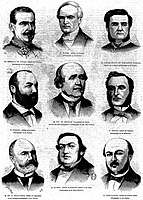Cabinet de Broglie I (France)
The First Cabinet of Albert de Broglie is the 56th cabinet of France and the fourth of the Third Republic, seating from 25 May 1873[1] to 26 November 1873[2], headed by Albert de Broglie as Vice-President of the Council of Ministers and Minister of Foreign Affairs, under the presidency of Patrice de MacMahon.
| Cabinet de Broglie I | |
|---|---|
56th Cabinet of France | |
 | |
| Date formed | 25 May 1873 |
| Date dissolved | 26 November 1873 |
| People and organisations | |
| President | Patrice de MacMahon |
| Head of government | Albert de Broglie |
| Member parties | |
| Status in legislature | Majority[lower-alpha 1] 390 / 759 (51%) |
| Opposition parties | |
| History | |
| Election(s) | 1871 legislative election |
| Predecessor | Dufaure II |
| Successor | de Broglie II |
History
After the election of Patrice de MacMahon as president to replace Adolphe Thiers, Albert de Broglie was called to form a new conservative[3] government. It indeed comprised only Legitimists, Orléanists and a small number of Bonapartists, in sharp contrast with the previous Cabinet Dufaure II dominated by republicans.
Initial expectations of the monarchist majority was the continuation of the small steps taken in order to restore once again a King in the country. However, that did not take into consideration the large part of the National Assembly and the population who remained largely republicans.[4]
One of these actions was one that would last. In November 1873, the Assembly voted a seven-year term for the President. It would be retained by the following Fourth and Fifth Republics until 2000, date to which it was replaced by a shorter five-year term.[5] The hope was that the position of President of the Republic was only temporary, a sort of place keeper for the return of a monarch.
The core of the government's policy was the Ordre Moral. Under this doctrine, religious education was reinforced with the goal of fighting republican radicalism and what was seen as bad influence of the Lumières. A number of administrations and high level functions were filled with men loyal to the policy, and the press was monitored. Finally, celebrations related to the republic, such as the 14th of July, Bastille Day or the 22nd of September, anniversary of the First Republic, were banned. The government imposed a heavily conservative and catholic grip on the country.[6]
It is under this cabinet, in July 1873, that was voted the law deciding that the construction of the Basilica of the Sacred Heart of Paris would be of public utility. The next day, another law limiting the number of Legion of Honour awarded passed the Assembly.
The cabinet resigned on 26 November 1873, and MacMahon asked de Broglie to form a second cabinet, leading to the Cabinet de Broglie II.[2]
Composition
| Vice-President of the Council of Ministers : Albert de Broglie | ||||||
| Portfolio[lower-alpha 2] | Name | Took office | Left office | Party | Ref. | |
|---|---|---|---|---|---|---|
| Minister of Foreign Affairs | Albert de Broglie | 25 May 1873 | 26 November 1873 | Orleanist | [1] | |
| Minister of Justice | Jean Ernoul | 25 May 1873 | 26 November 1873 | Legitimist | [1] | |
| Minister of Interior | Charles Beulé | 25 May 1873 | 26 November 1873 | Orleanist | [1] | |
| Minister of Finance | Pierre Magne | 25 May 1873 | 26 November 1873 | Orleanist | [1] | |
| Minister of War | Ernest de Cissey | 25 May 1873 | 29 May 1873 | Legitimist | [1] | |
| François du Barail | 29 May 1873 | 26 November 1873 | Bonapartist | [7] | ||
| Minister of Navy and Colonies | Charles de Dompierre d'Hornoy | 25 May 1873 | 26 November 1873 | Legitimist | [1] | |
| Minister of Public Instruction | Anselme Batbie | 25 May 1873 | 26 November 1873 | Orleanist | [1] | |
| Minister of Public Works | Alfred Deseilligny | 25 May 1873 | 26 November 1873 | Orleanist | [1] | |
| Minister of Agriculture | Joseph de la Bouillerie | 25 May 1873 | 26 November 1873 | Legitimist | [1] | |
| Undersecretary of State for the Ministry of Interior | Ernest Pascal | 25 May 1873 | 10 June 1873 | Bonapartist | [1] | |
Notes
- Complementary elections of 2 July 1871.
- Order of the list corresponds to the order of appointment.
References
- Government of the French Republic (25 May 1873). "Decree on the composition of the government". gallica.bnf.fr (in French). Retrieved 14 March 2020.
- Government of the French Republic (26 November 1873). "Decree on the composition of the government". gallica.bnf.fr (in French). Retrieved 14 March 2020.
- Ripley, George; Dana, Charles A. (1875). The American Cyclopaedia: A Popular Dictionary of General Knowledge, Volume 10. Appleton. p. 800. Retrieved 17 March 2020.
- Osgood, Samuel M. (1960). French Royalism under the Third and Fourth Republics. Martinus Nijhoff. p. 22. ISBN 978-94-015-0645-8. Retrieved 17 March 2020.
- Smith, Paul (2009). The Senate of the Fifth French Republic. Palgrave Macmillan. p. 13. ISBN 978-0-230-00811-3. Retrieved 17 March 2020.
- Porch, Douglas (1981). The March to the Marne: The French Army 1871-1914. Cambridge University Press. p. 12. ISBN 0-521-23883-8. Retrieved 17 March 2020.
- Government of the French Republic (29 May 1873). "Decree appointing the Minister of War". gallica.bnf.fr (in French). Retrieved 17 March 2020.